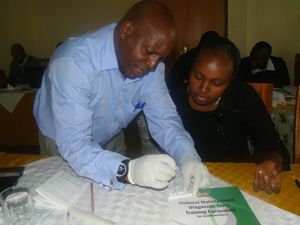During FY 2012, PMI contributed to the implementation of this policy by purchasing 1.7 million RDTs and supporting training on malaria laboratory diagnosis for more than 400 health workers nationwide.

During training in Kenya, health workers learn how to use malaria RDTs and interpret RDT results properly. Source: Yvonne Otieno / MSH
The Kenyan Government has adopted the policy of universal diagnosis before treatment for all fever cases suspected to be malaria. During FY 2012, PMI contributed to the implementation of this policy by purchasing 1.7 million RDTs and supporting training on malaria laboratory diagnosis for more than 400 health workers nationwide. USAID’s five regional integrated service delivery projects are also assisting with the roll out of RDTs.
The effects of this change in case management policy can be seen at facilities, such as the Mbale Rural Health Training Center in Western Province, which receives about 120 patients a day. One such patient is Victor; a one-year-old brought in by his mother who was concerned about her son’s high fever and poor appetite. Upon recommendation from the nurses, Victor received a rapid diagnostic malaria test and within 30 minutes Victor was diagnosed with malaria and immediately received treatment.
This might have been a different story three months earlier, when Victor’s mother could have waited hours for Victor to be diagnosed by microscopy in the lab and receive treatment, and lost an entire day’s income. “Previously, we used to rely solely on microscopy for malaria testing and with the limited number of laboratory technicians, patients would have to wait hours for their results. Some left before receiving test results because of the long distances they had to travel back home. An unknown number were also self-medicating to avoid the long lines,” explains Dr. Jacob Odipo, director of the health center.
According to Dr. Odipo, “Malaria RDTs have helped ease congestion in the laboratory and helped patients receive treatment faster, with only those who test positive for malaria receiving medication.” The RDTs enable faster diagnosis and quicker treatment of malaria, so children such as Victor receive appropriate treatment more quickly and malaria deaths can be averted.
